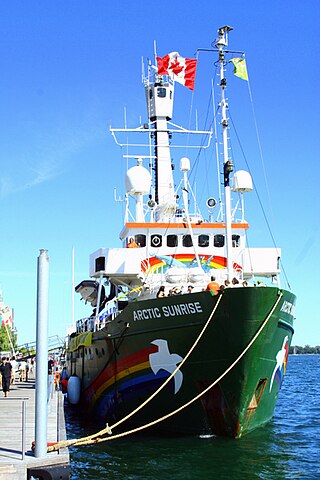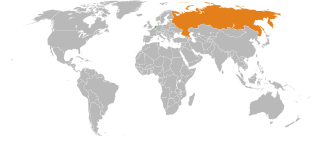
Greenpeace is an independent global campaigning network, founded in Canada in 1971 by a group of environmental activists. Greenpeace states its goal is to "ensure the ability of the Earth to nurture life in all its diversity" and focuses its campaigning on worldwide issues such as climate change, deforestation, overfishing, commercial whaling, genetic engineering, anti-war and anti-nuclear issues. It uses direct action, advocacy, research, and ecotage to achieve its goals.

Murmansk is a port city and the administrative center of Murmansk Oblast in the far northwest part of Russia. It sits on both slopes and banks of a modest ria or fjord, Kola Bay, an estuarine inlet of the Barents Sea, with its bulk on the east bank of the inlet. It is in the north of the rounded Kola Peninsula which covers most of the oblast. The city is 108 kilometres (67 mi) from the border with Norway and 182 kilometres (113 mi) from the border with Finland.

The Sea Shepherd Conservation Society (SSCS) is a non-profit, marine conservation activism organization based in Friday Harbor on San Juan Island, Washington, in the United States. Sea Shepherd employs direct action tactics to achieve its goals, most famously by deploying its fleet of ships to track, report on and actively impede the work of fishing vessels believed to be engaged in illegal and unregulated activities causing the unsustainable exploitation of marine life.

The Northeast Passage is the shipping route between the Atlantic and Pacific Oceans, along the Arctic coasts of Norway and Russia. The western route through the islands of Canada is accordingly called the Northwest Passage (NWP).

PJSC Gazprom is a Russian majority state-owned multinational energy corporation headquartered in the Lakhta Center in Saint Petersburg. As of 2019, with sales over $120 billion, it was, until 2023, ranked as the largest publicly listed natural gas company in the world and the largest company in Russia by revenue. In the 2020 Forbes Global 2000, Gazprom was ranked as the 32nd largest public company in the world. The Gazprom name is a contraction of the Russian words gazovaya promyshlennost. In January 2022, Gazprom displaced Sberbank from the first place in the list of the largest companies in Russia by market capitalization. In 2022, the company's revenue amounted to 8 trillion rubles. In 2023, the company is delisted from international markets, and continues substantial constriction in its operational results.

Sevmorput is a Russian nuclear-powered cargo ship. The 1988-built vessel is one of only four nuclear-powered merchant ships ever built and, after returning to service in 2016 following an extensive refit, the only such vessel to remain in service as of 2023.

Heidi Anneli Hautala is a Finnish politician and Member of the European Parliament (MEP) from Finland. She is a member of the Green League, part of the European Green Party.

PJSC Rosneft Oil Company is a Russian integrated energy company headquartered in Moscow. Rosneft specializes in the exploration, extraction, production, refining, transport, and sale of petroleum, natural gas, and petroleum products. The company is controlled by the Russian government through the Rosneftegaz holding company. Its name is a portmanteau of the Russian words Rossiyskaya neft.

Arctic Sunrise is an ice-strengthened vessel operated by Greenpeace. The vessel was built in Norway in 1975 and has a gross tonnage of 949, a length of 50.5 metres (166 ft) and a maximum speed of 13 knots. She is classified by Det Norske Veritas as a "1A1 icebreaker". The ship is powered by a single MaK marine diesel engine.
Peter Willcox is an American sea captain best known for his activism with the environmental organization Greenpeace. He was on board as captain of the Rainbow Warrior when it was bombed and sunk by the DGSE in New Zealand in 1985.

The Pechora Sea is an Arctic sea to the north-west of European Russia, forming the south-eastern portion of the Barents Sea. It is bordered to the west by Kolguyev Island; to the east by Vaygach Island's western coasts and the Yugorsky Peninsula; and to the north by the southern end of Novaya Zemlya.

Netherlands–Russia relations is the relationships between the two countries, the Kingdom of the Netherlands and The Russian Federation. Russia has an embassy in The Hague, and the Netherlands has an embassy in Moscow, a consulate in Saint Petersburg, and an honorary consulate in Yuzhno-Sakhalinsk.
Michael Bailey, described as "one of the foremost eco-warriors of our times" according to Rex Weyler, is a founding member of Greenpeace, along with Paul Watson, Patrick Moore, David McTaggart and others. He supervised the original Greenpeace flagship, Rainbow Warrior.
Prirazlomnoye field is an Arctic offshore oilfield located in the Pechora Sea, south of Novaya Zemlya, Russia, the first commercial offshore oil development in the Russian Arctic sector. The field development is based on the single stationary Prirazlomnaya platform, which is the first Arctic-class ice-resistant oil platform in the world. Commercial drilling was planned to begin in early 2012, however it was delayed at least until the Spring of 2013 due to protester's "safety concerns". Safety concerns have been raised about Prirazlomnoye platform, citing use of decommissioned equipment, however Gazprom's oil spill response plan for Prirazlomnaya was renewed in 2014, and most questions found their answers. The Arctic Prirazlomnoye field produced the 10 millionth barrel of Russian North Arctic Oil in March 2016.

Kumi Naidoo is a human rights and climate justice activist. He was International Executive Director of Greenpeace International and Secretary General of Amnesty International. Naidoo served as the Secretary-General of CIVICUS, the international alliance for citizen participation, from 1998 to 2008. As a fifteen-year old, he organised students in school boycotts against the apartheid regime and its educational system in South Africa. Naidoo’s activism went from neighbourhood organising and community youth work to civil disobedience with mass mobilisations against the white controlled apartheid government. Naidoo is a co-founder of the Helping Hands Youth Organisation. He has written about his activism in this period in his memoirs titled, Letters to My Mother: The Making of a Troublemaker. In the book Naidoo recounts the day of his mother’s suicide when he was just 15 and how it became a catalyst for his journey into radical action against the Nationalist Party’s apartheid regime.

Anti-whaling refers to actions taken by those who seek to end whaling in various forms, whether locally or globally in the pursuit of marine conservation. Such activism is often a response to specific conflicts with pro-whaling countries and organizations that practice commercial whaling and/or research whaling, as well as with indigenous groups engaged in subsistence whaling. Some anti-whaling factions have received criticism and legal action for extreme methods including violent direct action. The term anti-whaling may also be used to describe beliefs and activities related to these actions.

The Arctic policy of Russia is the domestic and foreign policy of the Russian Federation with respect to the Russian region of the Arctic. The Russian region of the Arctic is defined in the "Russian Arctic Policy" as all Russian possessions located north of the Arctic Circle. Approximately one-fifth of Russia's landmass is north of the Arctic Circle. Russia is one of five littoral states bordering the Arctic Ocean. As of 2010, out of 4 million inhabitants of the Arctic, roughly 2 million lived in arctic Russia, making it the largest arctic country by population. However, in recent years Russia's Arctic population has been declining at an excessive rate.

MSV Nordica is a Finnish multipurpose icebreaker and offshore support vessel. Built in 1994 by Finnyards in Rauma, Finland, and operated by Arctia Offshore, she and her sister ship Fennica were the first Finnish icebreakers designed to be used as escort icebreakers in the Baltic Sea during the winter months and in offshore construction projects during the open water season.

Save the Arctic is a Greenpeace campaign to protect the Arctic, principally by preventing oil drilling and unsustainable industrial fishing in the area completely, surrounded by an Arctic-Environmental economics-Zone. The campaign, begun in 2012, calls for a sanctuary in the uninhabited high seas area around the North Pole, similar to the Protocol on Environmental Protection to the Antarctic Treaty. The campaign aims to begin this process by prompting a United Nations resolution on protection for the Arctic. Due to Russian invasion in Ukraine, world's 13% oil reserves could be a melting point in the Arctic.
International piracy law is international law that is meant to protect against piracy. Throughout history and legal precedents, pirates have been defined as hostis humani generis, Latin for "the enemy of all mankind". The United Nations has codified much of the law in the United Nations Convention on the Law of the Sea (UNCLOS), which defines different types of piracy and ways to combat it.


















